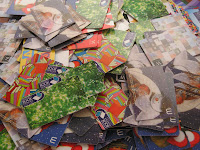NB. The review was published on page 55 of the New Scientist on 29 October 2011. It is written by Bob Holmes.
Dangerous debris
When Charles Moore sailed his 50-foot catamaran Alguita through one of the remotest, least-visuted parts of the Pacific Ocean in 1997, he was appalled to find plastic flotsam everywhere.
This discovery of what has come to be called the Great Pacific Garbage Patch - a vast area of the central Pacific where debris accumulates because of ocean current patterns - set Moore off on a crusade to measure, identify and, ultimately, try to prevent plastic pollution of the ocean. A decade and a half later, Moore's obsession has led to several scientific papers, documentary films, numerous media appearances, and now a book.
"I wasn't the first to be disturbed about plastic trash in the ocean, and I wasn't the first to study it," he writes in Plastic Ocean. "But maybe I was the first to freak out about it."
And freak out he certainly did. Chapter by chapter, Moore recounts his growing alarm as he learns about the abundance of plastic debris in the ocean and the ways it can get there. He also documents the clear harm that seabirds and marine mammals suffer when they become tangled in abandoned fishing nets or swallow balloons or plastic bags. And he makes a tentative case that even the smallest shards of plastic - the size and shape of plankton, and thus likely to be a eaten by fish and other planktivores - may carry a payload of toxic chemicals into the food chain.
In the end, though, many readers - especially New Scientist readers - are likely to find Moore unpersuasive. Partly that's because his book is a bit of a mess, rambling and disorganised. But the biggest problem is that Plastic Ocean comes across as a bit of a rant.
By his own account, Moore decided that plastic flotsam is a Very Bad Thing long before he gathered any solid evidence of any harm to sea life. And he is prone to making leaps: just because toxins can be detected in plastics does not mean that they are present in biologically meaningful doses. Moore my very well be right in thinking they are, but readers who are looking for a dispassionate conclusion based on the facts won't find it here.
The Other View
The Other View
Truth be told, I had only read half of this review before I began copying it. So, when I got to the penultimate paragraph I started to have doubts as to whether I should post it or not. But, leap taker or not, Moore's book is surely going to be an interesting read. A shame that, as suggested by Holmes, it may not create many new converts to the plastic cause, but even if it creates one then that is one more person fighting in what I consider to be the right corner.
Two other books on the plastic problem have also been published this year, if anyone wishes to add them to their Christmas list. Firstly, Plastic: A Toxic Love Story by Susan Freinkel was published earlier this year - a copy is currently sitting on my bookshop waiting patiently to be read. Or for what looks like a lighter read there is David de Rothschild's Plastiki: Across the Pacific on plastic: An adventure to save our oceans. I'm eager to get a closer look at this as I love the website based on the Plastiki's expeditions.
Two other books on the plastic problem have also been published this year, if anyone wishes to add them to their Christmas list. Firstly, Plastic: A Toxic Love Story by Susan Freinkel was published earlier this year - a copy is currently sitting on my bookshop waiting patiently to be read. Or for what looks like a lighter read there is David de Rothschild's Plastiki: Across the Pacific on plastic: An adventure to save our oceans. I'm eager to get a closer look at this as I love the website based on the Plastiki's expeditions.

















